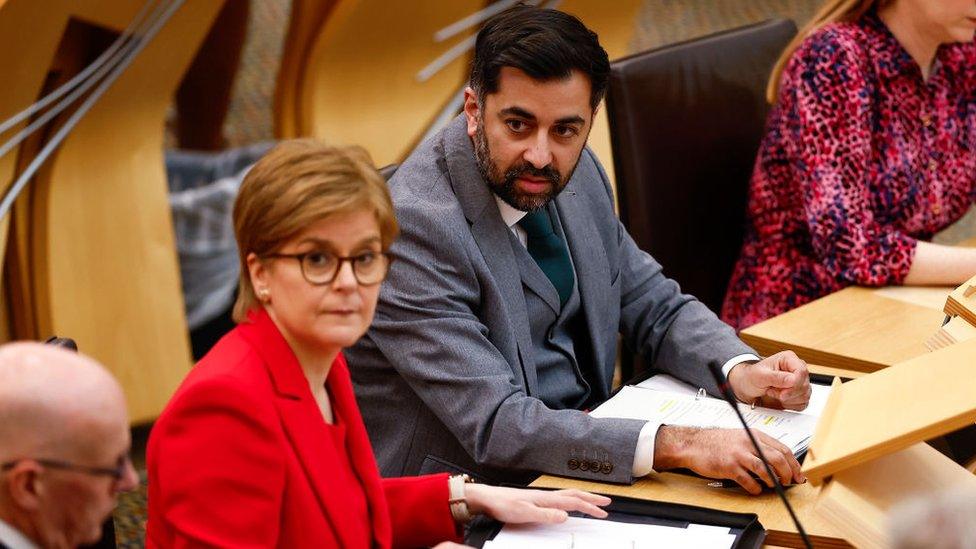Nicola Sturgeon called Boris Johnson a 'clown', inquiry hears
- Published
Junior counsel to the inquiry Usman Tariq read out a text conversation between Nicola Sturgeon and Liz Lloyd about Boris Johnson
Nicola Sturgeon called Boris Johnson a "clown" in an expletive-laden text conversation with her chief of staff, the UK Covid Inquiry has heard.
The inquiry was shown messages in which the former first minister described as "excruciating" a Downing Street announcement about a second Covid lockdown in England.
Ms Sturgeon said she was offended by Mr Johnson's "utter incompetence".
Her former aide said the language showed Ms Sturgeon's "frustration".
Mr Johnson, who was prime minister during the pandemic, has said he had a "friendly" relationship with Ms Sturgeon.
It came as First Minister Humza Yousaf, who also gave evidence to the inquiry on Thursday, announced an externally-led review into the Scottish government's use of mobile messaging apps, conceding that there are "challenges" in relation to how the app is used in government.
He conceded that the handling of requests for WhatsApp messages had not been the government's "finest hour" and had not given bereaved families confidence.
Liz Lloyd, who served as chief of staff and a strategic adviser to Ms Sturgeon between 2015 and 2023, said engagement with Mr Johnson became "pointless" in the early months of the pandemic.
Speaking at the inquiry - which is currently sitting in Edinburgh - she was shown messages from 31 October 2020 between her and Ms Sturgeon on the same evening as Mr Johnson announced a fresh lockdown for England.
Ms Sturgeon said his address to the nation was "(expletive) excruciating" and that the UK government's communications were "awful".
She told Ms Lloyd: "His utter incompetence in every sense is now offending me on behalf of politicians everywhere."
Ms Lloyd then said she was "offended" on behalf of all special advisers to which Ms Sturgeon replied: "He is a (expletive) clown."
Ms Lloyd told the inquiry the conversation was the result of "chaos" in the UK government.
She said the Scottish government had to "mitigate" that because although the restrictions did not apply in Scotland, they had an effect on how people north of the border viewed the pandemic.
"We were clearly not very complimentary about their communications handling that day," she told the inquiry.
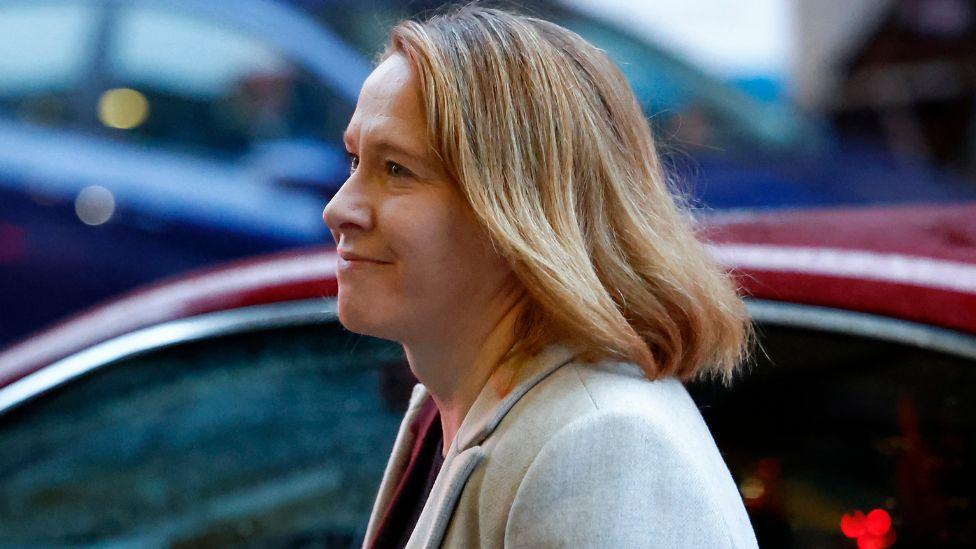
Nicola Sturgeon's former chief of staff, Liz Lloyd, has given evidence to the inquiry in Edinburgh
Asked if the relationship between Ms Sturgeon and Mr Johnson had broken down, Ms Lloyd replied: "I think broken down to a degree overstates what was there to break."
She said there was a "politeness" when the the two leaders had previously met but the relationship became "much harder" during the pandemic.
Ms Lloyd claimed it was evident during talks with devolved leaders that Mr Johnson "didn't want to be on those calls, he wasn't necessarily well briefed on those calls and he wasn't listening to the points we were making on those calls".
"I think engagement with him came to be seen as slightly pointless during this period," she added.
The inquiry heard that as early as March 2020 Ms Lloyd had described Cobra, the UK government's emergency response committee, as a "shambles".
She said in broader terms there was better communication between the two governments, particularly on health, but that discussions with the prime minister "didn't get us anywhere".
Mr Johnson was quizzed about his relationship with Ms Sturgeon when he appeared in front of the Covid inquiry in December.
"When I have talked to her, we have got on very well and had a friendly relationship," he said.
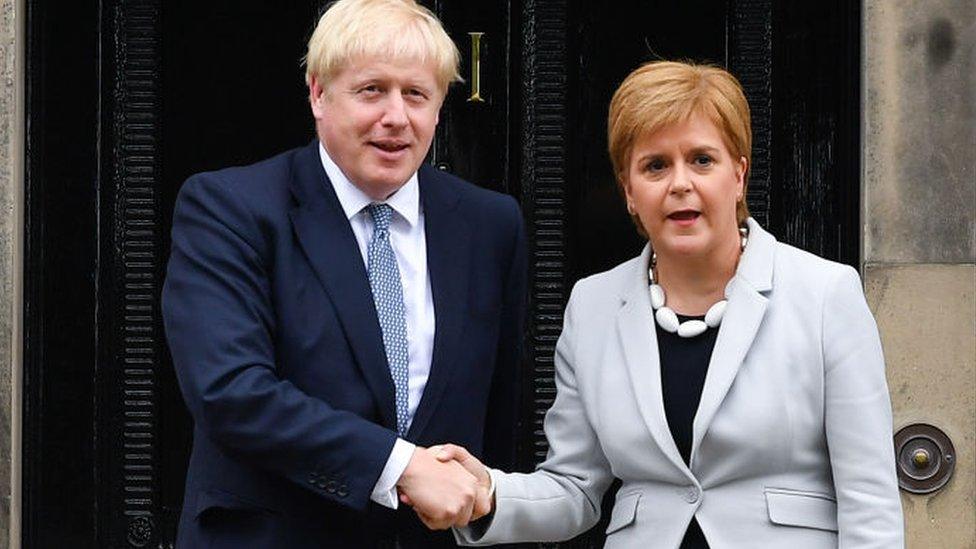
Mr Johnson has previously said he had a "friendly" relationship with Ms Sturgeon during the pandemic
The inquiry also heard that Ms Lloyd told Ms Sturgeon in WhatsApp messages that she wanted a "good old-fashioned rammy" with the UK government so she could "think about something other than sick people".
Ms Lloyd told Ms Sturgeon she had "set a timetable" for the UK government to answer the Scottish government on furlough as a "purely political" move in the messages between herself and the former first minister on 1 November 2020.
Ms Sturgeon said: "Yeah, I get it. And it might be worth doing. I've sent a rough formulation of what I might say tomorrow."
Ms Sturgeon is expected to give evidence to the inquiry next week.


The tight relationship between Liz Lloyd and Nicola Sturgeon is reflected in the blunt language Ms Sturgeon used in a message to her then chief of staff, describing Boris Johnson as a clown.
No one in the SNP will be bothered about that — it's not far from the former first minister's publicly-expressed view.
There are though thornier questions for Ms Sturgeon about her style of government.
Was it too tightly controlled? Would better decisions have been taken if dissent had actually been encouraged? Why were private mobile devices used for public business? And should better records have been kept?
The answer to that last one is yes, according to the current first minister, adding to the pressure on his predecessor.
Another theme of the hearings in Edinburgh has been the constitution.
The Scottish government is accused of focusing on independence rather than tackling the virus.
Ms Lloyd and others say that is grossly unfair — although they do argue that a lack of powers over Scotland's finances and external borders hampered their ability to respond.

Ms Lloyd was the first Scottish government figure to submit WhatsApp messages to the inquiry in July 2023. However, she said she had lost her messages prior to September 2020, which meant she had none covering the initial stages of the pandemic.
The former special adviser said she was not aware to the best of her recollection of a government mobile messaging policy introduced in 2021 which suggested some messages should be wiped every month.
She added she did not think she would have deleted information that could be subject to a freedom of information request even if she had knowledge of the policy.
Last week, counsel to the inquiry, Jamie Dawson KC, said Ms Sturgeon appeared to "have retained no messages whatsoever".
On Sunday, Ms Sturgeon said copies of some of her messages had been retrieved and were handed to the inquiry last year.
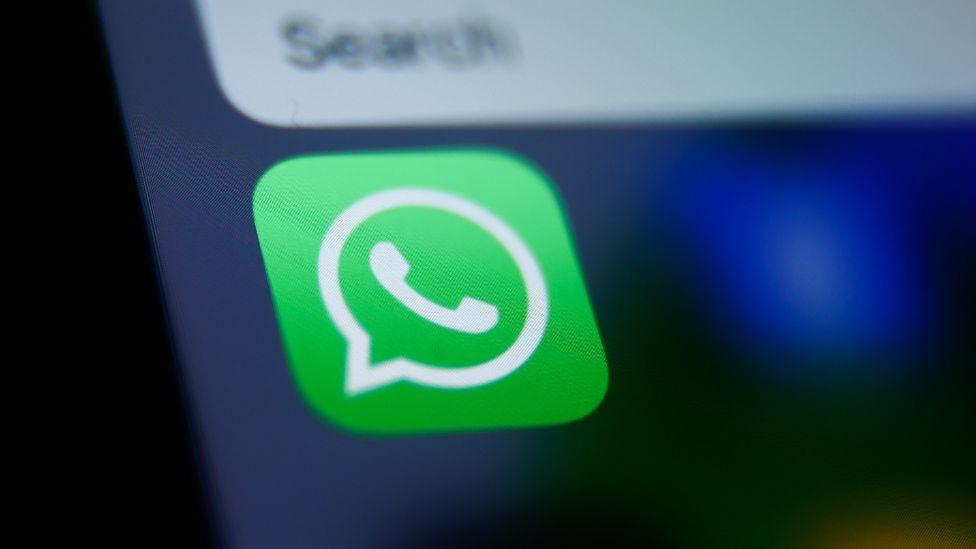
The inquiry has been told that Ms Sturgeon did not keep any of her WhatsApp messages
Earlier this week, the inquiry was told Ms Sturgeon provided a public health expert with an SNP email address where she said she could be contacted "privately" alongside her official email during a discussion around a briefing paper.
It has also been revealed Chief Medical Officer Gregor Smith and National Clinical Director Jason Leitch regularly deleted WhatsApps during the pandemic, and encouraged others to do so.
They both said they were following Scottish government policy and that records about decision making were properly archived.
'Politicisation of the pandemic'
The inquiry was also shown a document from the cabinet showing priorities for preparations going forward in July 2020, stating that each portfolio should prepare for the combined effects of Covid-19 and the transition period, and agree that consideration should be given to "restarting work on independence".
Inquiry chair Lady Hallett said: "It does look a bit like the politicisation of the coronavirus pandemic, doesn't it?"
Ms Lloyd replied it was not her "understanding" that the government was not seeking to politicise the situation "at that time".
Lady Hallett suggested it looked like some members of cabinet agreed to "capitalise on the pandemic to advance cause of independence".
Ms Lloyd said: "It says consideration was given to this but was not done at this time."
Speaking at the inquiry later on Thursday, Mr Yousaf described his government's handling of inquiry requests as "frankly poor" and offered an apology.
Humza Yousaf said Nicola Sturgeon liked to keep a “tighter cast list” when making some Covid decisions
The first minister - who initially served as justice secretary during the pandemic, before becoming between health secretary in May 2021 - said there were times that calls made by his predecessor Ms Sturgeon were not "cascaded" to all ministers and there were times when she wanted a "tighter cast list" for decision-making.
In messages between Mr Yousaf and Prof Leitch on 20 May, 2021, the adviser said: "There was some first minister 'keep it small' shenanigans as always."
Seemingly referring to decision making, the national clinical director said: "She actually wants none of us."
Mr Yousaf told the inquiry: "I don't doubt of course there were times the former first minister needed a tighter cast list and wanted one.
"I think this is a classic example of Jason perhaps over-speaking."
Mr Yousaf also said he used his own personal phones to conduct official business during the course of the pandemic.
Mr Yousaf told the inquiry in October that his messages had not been retained, but he later recovered them from an old phone, the inquiry heard.
Police federation criticism
The inquiry was later shown messages from 19 June 2020 between Mr Yousaf and then deputy first minister John Swinney in which Mr Yousaf described the Scottish Police Federation (SPF) as a "disgrace".
"Right through this pandemic they have shown an arrogance and retrograde thinking," he added, claiming that the then Police Scotland Chief Constable Iain Livingstone "was livid last night".
Mr Yousaf told the inquiry: "Sometimes when you are venting those private conversations to a colleague you use language that you regret."
He said he had a "good relationship" the SPF but that he did "not always get along" with its previous leadership.
He accused the SPF of not being "supportive" of officers in enforcing Covid rules, adding: "I thought the way they articulated that was deeply, deeply unhelpful."
Mr Yousaf said he had the "greatest amount of respect" for individual officers, who he described as "absolutely integral to public health efforts".
- Published16 January 2024
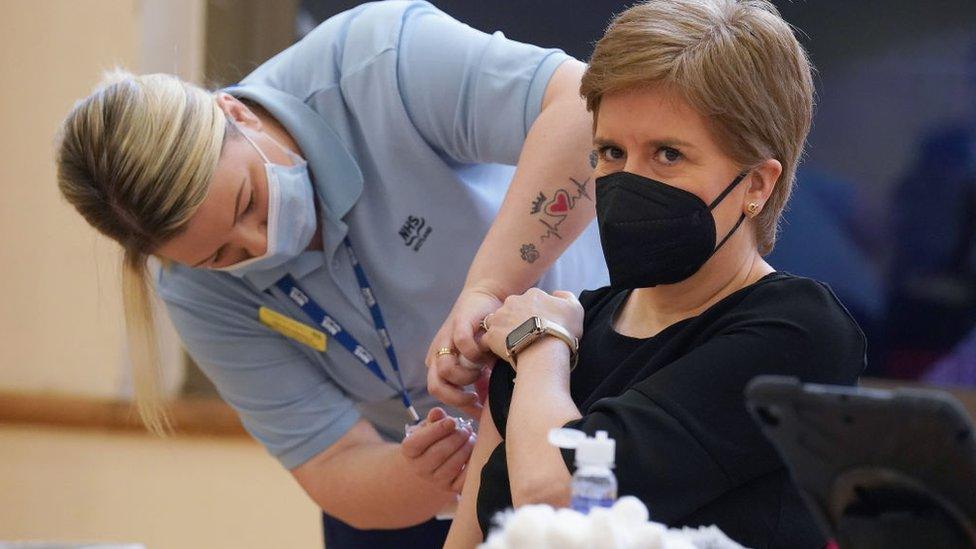
- Published20 January 2024
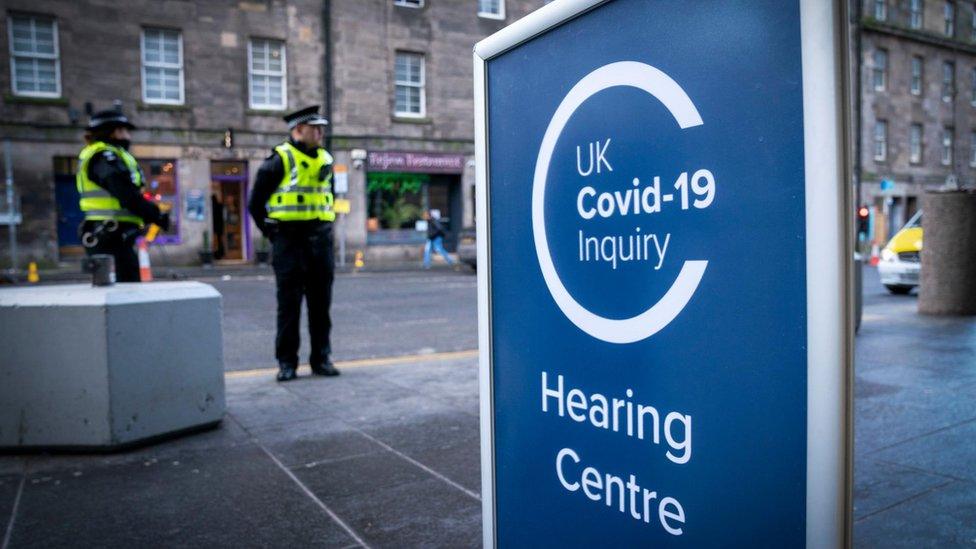
- Published1 January 2024
